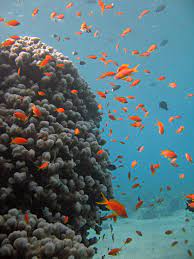Coral reefs are really important. While they only cover a small area (under 1% of the earths surface area) they support about 25% of all marine life, including more than 4000 species of fish.

They have grown up very slowly, over many thousands, or even millions of years. This has been possible because the sea temperature has been relatively stable over that time. Unfortunately, they are very sensitive to temperature changes. Bleaching occurs when the the Zooxanthellae, which give the coral their colour, leave because temperature rises. If the temperature stays high for more than about a week, the reefs will die (the are fed by the zooxanthellae, which they shelter, and cant survive without).
A few years ago in 2020, in the Gulf of Aqaba, a trench at the point where Egypt, Israel, Jordan and Saudi Arabia meet, a group of corals were found that could withstand extreme temperatures – with normal corals, 1 degree higher temperature than normal that lasts for a week, yet these corals have survived a 7 degree rise – without expelling their Zooxanthellae. It appears that this is because the Red sea has a “strong latitudinal temperature gradient”, which simply means that it does not take a strong storm to blow hotter or colder water into the area.
During the last ice age, sea levels fell so low that the Red sea was cut off from other seas. It became very salty, but when the ice caps melted once more the corals migrated through. This one bottleneck, though, has summer temperatures of 34° C, and winter temperatures of 16°C, so they had to develop a temperature resistance, which they then brought with them.
They are then cross breeding various corals, so as to rapidly give many species this ability.
Unfortunately, it is felt that the race is on, as it is thought that only 30 years are left before 90% of the worlds corals will be lost. This is because sea temperatures are rising, and it is thought that once the rise reaches 1.5° to 2.0°C above historical levels, most will die off.











